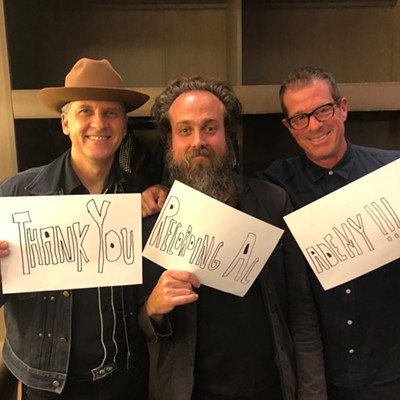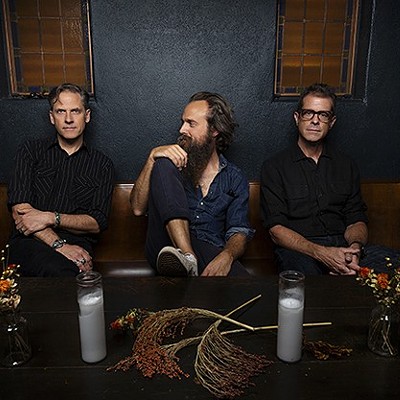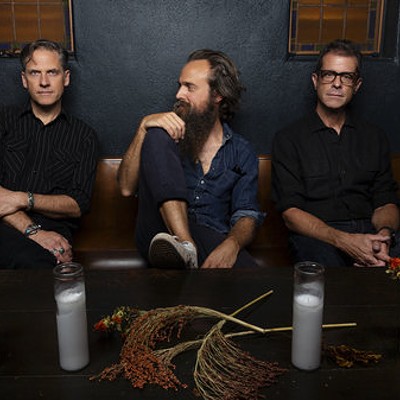When it came time to record a new Calexico record, Joey Burns and John Convertino decided they needed to get out of town.
They had started work on the album in Tucson nearly a year ago, but life kept interfering, with a steady stream of distractions and interruptions. So on the advice of producer Craig Schumacher of Wavelab Studio, they headed to New Orleans for 12 days last December.
"We all had a strong connection to that place, and it felt like the right time to go there," Burns says. "It really let us just focus 12 hours a day on making a record."
Burns, Convertino and Schumacher set up shop in the Living Room, a former church that's now home to a recording studio. It didn't take long for the duo to find the inspiration they needed in their new environs.
The result, all these months later, is Algiers, named for the 15th Ward neighborhood that's home to the Living Room. The new record, released this week, accents Calexico's classic desert noir with a twist of Afro-Cuban flavor.
"I think going to a different location was really inspirational, to get out of the comfort zone of what we're familiar with in Tucson," Convertino says.
In a way, Convertino says, it was also a return to their roots—just the two of them, playing together until a song takes shape, as they did on Spoke, their 1997 debut.
"A lot of the songs are based on improvisations that happen between Joey and me, initially, when we sit down with guitar and drums," Convertino says.
Here's how Calexico writes a song: Burns and Convertino start jamming, trying to catch a mood as Schumacher listens with a keen ear. He rolls tape when he senses that they're finding a song.
"Craig knows when to pick up when we've almost created an arrangement," Convertino says. "I feel like that's a magical moment—the song is being recorded as it's being thought of."
During their time in New Orleans, the skeletons of the songs on Algiers—and a lot of other stuff that didn't make the cut—were laid down on tape. Then they returned to Tucson and huddled with Schumacher at Wavelab, bringing in more musicians to layer in keyboards, horns, strings and the occasional flourish of a mellotron or theremin.
The final step was crafting the lyrics.
The songs on Algiers explore familiar themes found in Calexico's music: People are in motion to new places and often crosswise with the law, former lovers or themselves.
"In a lot of my songs, there is that character who is en route, for different reasons, and the songs come together on that living road," Burns says.
While Burns has shouldered most of the lyrical work in the past, he found himself struggling to find the right words at times, so he asked Convertino to take a shot. Convertino embraced the challenge, finding inspiration in everything from the pages of The New York Times to his home life.
"The music comes first; so many times, the lyrics come from the mood of the song," Convertino says. "A lot of times, it tells you what to put on it, or not to put anything at all on it."
It's been four years since Calexico released a studio album. The last one, Carried to Dust, was hailed for its "mixture of organic warmth, welcome variety and subtle complexity" by Pitchfork magazine. Magnet called it the band's "best-sounding record: Each voice and instrument has its place, wheeling around Convertino's graceful drumming like dancers going around the maypole."
The band has stayed busy since releasing Carried to Dust. Burns and Convertino have played a supporting role on albums by Tom Russell, Neko Case, Sergio Mendoza and others. They traveled to Cuba to back up Amparo Sanchez on an album recorded in the same studio that produced the Buena Vista Social Club. They've toured with Arcade Fire.
Burns produced Amos Lee's Mission Bell, which debuted at No. 1 on the Billboard 200 upon its release in January 2011. They've dabbled in soundtrack work for two films: John Michael McDonagh's indie-comedy The Guard, and Aaron Schock's Circo, a documentary about a traveling Mexican circus. They've helped organize the annual Festival en el Barrio, a spring musical celebration in downtown Tucson to benefit radio station KXCI FM 91.3. They've headlined an annual Dance of the Dead, to cap off the autumn All Soul's Procession, as a fundraiser for Many Mouths One Stomach, the nonprofit group that organizes the march through downtown.
They've given their support to political causes, including voter-registration efforts and concerts in support of former U.S. Rep. Gabrielle Giffords. In the wake of the Jan. 8, 2011, shooting, they played benefit concerts. And on the anniversary of the rampage earlier this year, they helped lift spirits as part of a remembrance on the UA mall.
They've been through a lot of changes in their personal life. Burns became the father of twin daughters who are now 16 months old, while Convertino recently relocated to Ohio after his wife landed a job teaching at Kent State University.
There have been a lot of changes in the music business in the last four years as well. The label they'd been with for more than a decade, Chicago's Touch 'N' Go, essentially folded.
"It's really sad not to have the staff and all the friends we've relied on for so long," Burns says.
Now the band is on ANTI-, a label that has put out records by the likes of Wilco, Tom Waits, Neko Case and Beth Orton.
"ANTI- Records really stands out, because they're doing things in the mindset and philosophy (in which) musicians want to be heard," Burns says. "They don't push you to do things that are unnatural. So it's great to be able to work with new friends like that."
Earlier this week, Calexico headed to Europe for the first leg of a tour promoting Algiers.
The touring members of Calexico include Burns and Convertino as well as Calexico regulars Jacob Valenzuela and Martin Wenk. Keyboardist Sergio Mendoza is putting his own band, Y la Orkesta, on hold for the next few months for the tour. Jairo Zavala, a Spanish guitarist who performs under the name Depedro, will be filling in for Paul Niehaus (who had other commitments this fall). And the newest addition to the band, Ryan Alfred, is taking up the standup and electric bass normally played by Volker Zander.
The seven musicians spent the two weeks before the tour hunkered down at Waterworks Recording, east of downtown. They worked through the new songs and reworked old ones, honing how they will sound live. They went back and forth over little details: Should the bass and drums get the spotlight? Do they need keyboards to fill the space? Can the guitar go up an octave? When should they bring in the piano? When should the trumpet soar? How is each song built?
It's just one more step in the process of transforming the polished recorded songs into a live performance. And it never ends, because each performance will bring new surprises as they remix the set list.
"We're always trying to come up with some new aspect to our sound, and we don't want to fall into a cliché," Burns says. "Even though we still have a lot of the same instrumentation on this record and with us on tour, we really want to go somewhere new. That's the thrill, and otherwise, the thrill is gone, so why do this?"















